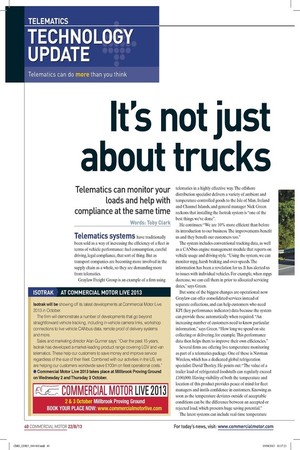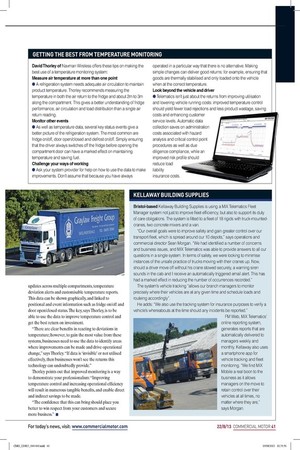It's not just
Page 32

Page 33

If you've noticed an error in this article please click here to report it so we can fix it.
about trucks
Telematics can monitor your loads and help with compliance at the same time
Telematics systems have traditionally been sold as a way of increasing the efficiency of a fleet in terms of vehicle performance: fuel consumption, careful driving, legal compliance, that sort of thing. But as transport companies are becoming more involved in the supply chain as a whole, so they are demanding more from telematics. Graylaw Freight Group is an example of a firm using
telematics in a highly effective way. The offshore distribution specialist delivers a variety of ambient and temperature-controlled goods to the Isle of Man, Ireland and Channel Islands, and general manager Nick Green reckons that installing the Isotrak system is "one of the best things we've done".
He continues: "We are 10% more efficient than before its introduction to our business. The improvements benefit us and they benefit our customers too."
The system includes conventional tracking data, as well as a CANbus engine management module that reports on vehicle usage and driving style. "Using the system, we can monitor mpg, harsh braking and over-speeds. The information has been a revelation for us. It has alerted us to issues with individual vehicles. For example, when mpgs decrease, we can call them in prior to allocated servicing dates," says Green.
But some of the biggest changes are operational: now Graylaw can offer consolidated services instead of separate collections, and can help customers who need KPI (key performance indicator) data because the system can provide these automatically when required. "An increasing number of customers need to know particular information," says Green. "How long we spend on site collecting or delivering, for example. This performance data then helps them to improve their own efficiencies."
Several firms are offering live temperature monitoring as part of a telematics package. One of these is Navman Wireless, which has a dedicated global refrigeration specialist: David Thorley. He points out: "The value of a trailer load of refrigerated foodstuffs can regularly exceed £100,000. Having visibility of both the temperature and location of this product provides peace of mind for fleet managers and instils confidence in customers. Knowing as soon as the temperature deviates outside of acceptable conditions can be the difference between an accepted or rejected load, which presents huge saving potential." The latest systems can include real-time temperature
updates across multiple compartments, temperature deviation alerts and customisable temperature reports. This data can be shown graphically, and linked to positional and event information such as fridge on/off and door open/closed status. The key, says Thorley, is to be able to use the data to improve temperature control and get the best return on investment.
"There are clear benefits in reacting to deviations in temperature; however, to gain the most value from these systems, businesses need to use the data to identify areas where improvements can be made and drive operational change," says Thorley. "If data is 'invisible' or not utilised effectively, then businesses won't see the returns this technology can undoubtedly provide."
Thorley points out that improved monitoring is a way to demonstrate your professionalism: "Improving temperature control and increasing operational efficiency will result in numerous tangible benefits, and enable direct and indirect savings to be made. "The confidence that this can bring should place you better to win respect from your customers and secure more business." •









































